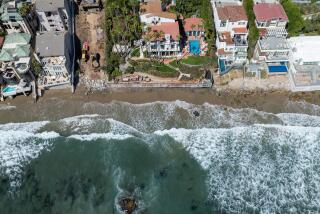CHRONOLOGY OF THE WETLANDS
Here is a chronology of events affecting the Bolsa Chica wetlands in recent--and not so recent--history.
Thousands of years ago--Gabrielina Indians live on the bluffs overlooking Bolsa Gap. The lowlands consist of a broad, shallow bay or estuary bordered by fresh and saltwater marshes. Freeman Creek, which originated in what is now Westminster, flows through the gap before emptying into the Pacific.
1795--The Bolsa Chica wetlands area becomes part of a Spanish land grant that covered a sprawling area along the California coast.
19th Century--The grant is partitioned several times. Cattle ranching and farming become commonplace on the mesas overlooking the wetlands.
1899--The Bolsa Chica Gun Club builds a dam across Freeman Creek, causing the natural entrance to the ocean to become sanded in. Gradually, the wetlands begin to dry up. There is more farming, followed by urban development.
1930s--Oil rigs sprout in the lowlands.
1964--Congress authorizes the U.S. Army Corps of Engineers to study the feasibility of a small-craft harbor at Bolsa Chica.
1970--Signal Bolsa Corp. acquires 1,200 acres of Bolsa Chica from former owners.
March 15, 1973--Signal Companies and the state sign a settlement agreement in which the state acquires title to a 300-acre parcel in the Bolsa Chica lowlands. Also, to compensate for the effect of a proposed ocean entrance system on the 300-acre parcel, Signal leases to the state at no cost an adjacent 230 acres until 1984 (later extended to 1987).
1977--Orange County completes a feasibility study for a proposed linear regional park in Bolsa Chica that would connect Huntington Central Park, the state Department of Fish and Game Ecological Reserve and Bolsa Chica State Beach. The park would be built as part of the Signal development.
1978--The state builds a levee, enclosing 150 acres of the state’s 300-acre parcel. Seawater once again pours into Bolsa Chica, restoring a portion of the damaged wetlands.
1979--Amigos de Bolsa Chica, an environmental group, sues the state, alleging that the 1973 land exchange agreement is a gift of public trust lands that violates the state Constitution and that certain actions by Signal and others violated the state Coastal Act. The case still is pending. (The Amigos group recently filed another suit with additional allegations.)
Jan. 20, 1982--The Board of Supervisors approves a land use plan that includes 600 acres of salt marsh, a navigable ocean entrance, a marina with 1,800 boat slips, coastal-oriented commercial support facilities, open-space recreation and 5,700 medium, high- and heavy-density residential dwellings. Signal maintains that only 453 acres of the property are environmentally sensitive wetlands.
January, 1983--U.S. Army Corps of Engineers completes a progress report indicating that a navigable entrance at Bolsa Chica is technically feasible, pending further economic and other studies.
July, 1984--Signal agrees to restore 915 acres of wetlands.
Oct. 23, 1985--The Coastal Commission unanimously approves a plan preserving 915 acres of wetlands and allowing for development of a 1,300-slip marina, open-space recreation, 5,700 residential units and restaurants and hotels. Still to be settled is whether to carve a navigable ocean channel leading into the development.
Dec. 18, 1985--Board of Supervisors approves the plan ratified by the Coastal Commission.
Oct. 16, 1986--Congress enacts the omnibus Water Resources Development Act, which includes a provision to establish a project at Bolsa Chica that would allow federal loans for a navigable ocean channel at Bolsa Chica, if determined to be technically and economically feasible. The loans would be paid back over several decades from revenues generated from the project.
March 6, 1987--At the request of Signal, state Sen. Marian Bergeson (R-Newport Beach) introduces legislation to create a special, privately controlled district to govern the early stages of development at Bolsa Chica. This would put Signal in a better position to secure federal loans.
July 13, 1987--Amid a flurry of proposed amendments to SB 1517 by Signal, state agencies and the City of Huntington Beach, a hearing on the bill before the Assembly Natural Resources Committee is put over to Aug. 17.
More to Read
Sign up for Essential California
The most important California stories and recommendations in your inbox every morning.
You may occasionally receive promotional content from the Los Angeles Times.









